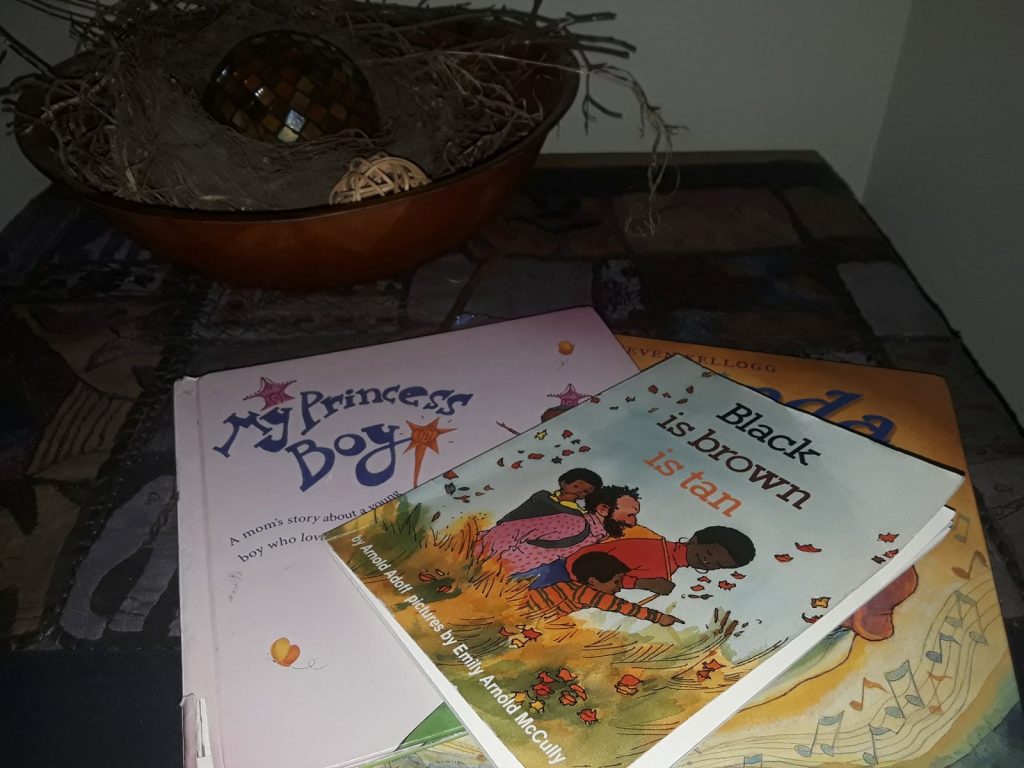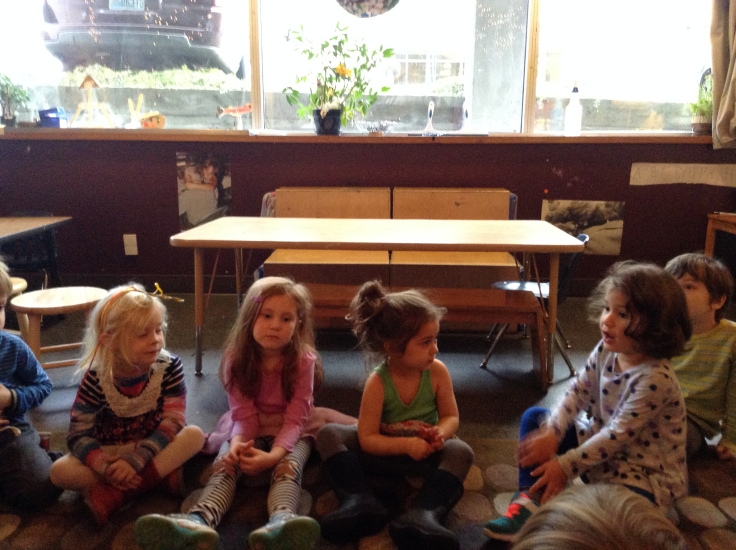
Building an Anti-Bias Library: Part One – Racial Identity, Culture and Language
[et_pb_section fb_built=”1″ admin_label=”section” _builder_version=”3.22″][et_pb_row admin_label=”row” _builder_version=”3.25″ background_size=”initial” background_position=”top_left” background_repeat=”repeat” make_fullwidth=”off” use_custom_width=”off” width_unit=”on”][et_pb_column type=”4_4″ _builder_version=”3.25″ custom_padding=”|||” custom_padding__hover=”|||”][et_pb_text _builder_version=”3.27.4″ background_size=”initial” background_position=”top_left” background_repeat=”repeat” use_border_color=”off” border_color=”#ffffff” border_style=”solid”]
PREFACE:
On September 27th, 2017, we welcomed Debbie LeeKeenan, Dr. Caryn Park and Dr. Maggie Beneke to kick off of 2017-2018 Educator Discussion Series focusing on Anti-Bias Education.
Their workshop titled: Using Children’s Literature to Provoke Conversations on Challenging Topics focused on how to use the power of pictures, illustrations, films, and literature to learn about, and rejoice in who we are as a diverse community. This session also explored how to use children’s literature and read-alouds as a way to provoke and facilitate conversations on potentially challenging topics with young children.
As we approach Black History month, a time where many children of color may be subject to more racist and derogatory remarks than usual, we revisit this session with part one of a four part series to help aid you in building a comprehensive list of Anti-Bias books. After-all, as literary gatekeepers of our classrooms and homes, it is our duty to cultivate a more inclusive library collection!
[/et_pb_text][et_pb_text _builder_version=”3.27.4″ background_size=”initial” background_position=”top_left” background_repeat=”repeat” use_border_color=”off”]
[/et_pb_text][et_pb_divider show_divider=”off” disabled_on=”on|on|off” _builder_version=”3.23.4″ height=”11px” hide_on_mobile=”on”][/et_pb_divider][et_pb_text _builder_version=”4.0.7″ background_size=”initial” background_position=”top_left” background_repeat=”repeat” hover_enabled=”0″ use_border_color=”off”]
Building an Anti-Bias Library – Racial Identity, Culture and Language
When building an inclusive library and deciding on which resources should be a part of it, this workshop recommends that you ask yourself the following questions to ensure that each book you select is an appropriate book for your classroom as part of an anti-bias approach:
- Timing: When is it appropriate to introduce this book? (developmentally appropriate, right time in the year)
- Context: What needs to be in place for this book to be effective?
- Relationships: Does this book connect authentically to you, your children, families or networks?
- Knowledge/accuracy: What do you know about this issue? What is the source and accuracy of your information? What don’t you know? How can you learn more? (preparation, comfort level)
- Children’s Knowledge: What do the children know about this topic/issue? What are their questions?
- Pedagogy: How will you share this book and respond to questions/responses?
- Continuity: How will you continue the issues raised in this book in the future – to ensure depth and complexity?
The visual and verbal messages young children absorb from books and other media strongly influence their ideas about themselves and others. (For more on how children form their identities, please join us for our next EDS event on Feb 8th, 2018 titled: Who am I? Understanding Children’s Identity Formation facilitated by Dr. Sarah Lytle, Director of the University of Washington Institute for Learning & Brain Science (I-LABS)). Therefore, carefully choosing children’s books is a vital educational task. Here are the first two out of ten ideas to consider when reviewing children’s books for misinformation and stereotypes.
1. Check the illustrations
Look for stereotypes AND tokenism – A “stereotype” is an oversimplified generalization about a particular group that creates the idea that we know something about an individual person based on the person’s perceived membership in that group. All books should depict people compassionately and as complex human beings. If the books contain stereotypes, either engage the children in critical thinking (e.g., “Do the people in this book look like all the people you know? Who’s missing?”) or eliminate the books from your collection. Regularly seeing only one of any group—either in your book collection (e.g., one story about Mexican Americans among many books about White families) or in a story itself (e.g., one African American child among many White children)—teaches that the token group is less important than the other group(s) featured.
2. Check the story line
Even if a book shows visual diversity, the story line may carry messages of bias that may be obvious or quite subtle. Consider these questions:
- Do the stories typically depict people of color, girls, children from low-income families, and children with disabilities as dependent or passive, while depicting White people, boys, members of the middle-class, and “able-bodied” children in leadership and action roles?
- Who typically causes a problem and who resolves it? Are problems always solved individually, or do some books show a group of children and/or adults working together to solve a problem?
- To gain acceptance and/or approval in the book, does a child of color, a girl, or child with a disability have to exhibit extraordinary qualities?
- Are the achievements of girls and women due to their looks or relationship with boys and men, or are they based on their own initiative and intelligence?
To help you get started, here are a list of Children’s Books supporting Anti-Bias Education recommended by Debbie LeeKeenan:
Racial Identity:
The Name Jar by Choi, Y. (2003)
Hairs-Pelitos by Cisneros, S. (1994)
All the Colors of the Earth by Hamanaka, S. (1994)
Two Eyes, A Nose and A Mouth by Intrater. R. (2000).
The Colors of Us by Katz, Karen. (1999)
Shades of Black by Pickney, S. (2006)
Culture and Language:
To Be a Kid by Ajmera, M. (1999)
Mirror by Baker, J. (2010)
Marisol McDonald Doesn’t Match byBrown, M. (2011)
Everybody Cooks Rice by Dooley, N. (1992)
Whoever We Are by Fox, Mem, (2006)
Tortillitas Para Mama by Griego, M., Bucks, B., Gilbert, S., and Kimball, L. Tortillitas Para Mama (1981)
Golden Domes and Silver Lanterns: A Muslim Book of Colors by Khan, H (2012)
Big Red Lollipop by Khan, R. (2010)
Same Same but Different by Kostecki-Shaw, J. (2011)
The World In A Second by Martins, I. & Carvalho, B (2015)
Around the World by Morris, Ann. *This is a series of books written by Ann which includes ‘Houses and Homes,’ ‘Bread, Bread, Bread,’ ‘Tools’ etc.*
The Swirling Hijaab by Naimhbint, R. (2002)
Aekyung’s Dream by Paek, Min. (1988)
Many Ways: How families practice their beliefs and religions by Rotner, S. & Kelly, S. Millbrook Press (2006)
Nine-In-One Grr! Grr! by Xiong, Blia & Spagnoli, Cathy (1989)
A child’s foundation for respecting and valuing difference beyond their own families and communities starts with you! Please check back for the second installment of our series where we will recommend children’s books focusing on Different Abilities and Economic Class.
Check Out Our Educator Discussion Series
While most anti-bias curriculums begins by focusing on the children and families – creating the foundation for valuing differences – some organizations forget to focus on the staff that represents their programs. Hilltop Study Days and Inquiry Days (multi-day visits), are full day visits to Hilltop to see child-centered and reflective practice in action, while exploring proven models for supporting responsive curriculum in your own programs. These visits will allow educators and leadership staff to discuss practical strategies for planning curriculum that builds directly from the interests and needs of the children and families in your schools. Join us to discover organizational systems and administrative practices that can bring your own program values to life! For more information please visit either Hilltop Study Days or Inquiry Visits, or email Mike at institute@hilltopcc.org.
[/et_pb_text][et_pb_comments _builder_version=”3.16″ header_font_size_tablet=”51″ header_line_height_tablet=”2″ use_border_color=”off” border_color=”#ffffff” border_style=”solid” button_text_size__hover_enabled=”off” button_text_size__hover=”null” button_one_text_size__hover_enabled=”off” button_one_text_size__hover=”null” button_two_text_size__hover_enabled=”off” button_two_text_size__hover=”null” button_text_color__hover_enabled=”off” button_text_color__hover=”null” button_one_text_color__hover_enabled=”off” button_one_text_color__hover=”null” button_two_text_color__hover_enabled=”off” button_two_text_color__hover=”null” button_border_width__hover_enabled=”off” button_border_width__hover=”null” button_one_border_width__hover_enabled=”off” button_one_border_width__hover=”null” button_two_border_width__hover_enabled=”off” button_two_border_width__hover=”null” button_border_color__hover_enabled=”off” button_border_color__hover=”null” button_one_border_color__hover_enabled=”off” button_one_border_color__hover=”null” button_two_border_color__hover_enabled=”off” button_two_border_color__hover=”null” button_border_radius__hover_enabled=”off” button_border_radius__hover=”null” button_one_border_radius__hover_enabled=”off” button_one_border_radius__hover=”null” button_two_border_radius__hover_enabled=”off” button_two_border_radius__hover=”null” button_letter_spacing__hover_enabled=”off” button_letter_spacing__hover=”null” button_one_letter_spacing__hover_enabled=”off” button_one_letter_spacing__hover=”null” button_two_letter_spacing__hover_enabled=”off” button_two_letter_spacing__hover=”null” button_bg_color__hover_enabled=”off” button_bg_color__hover=”null” button_one_bg_color__hover_enabled=”off” button_one_bg_color__hover=”null” button_two_bg_color__hover_enabled=”off” button_two_bg_color__hover=”null”][/et_pb_comments][et_pb_button button_url=”https://hilltopcc.com/institute” url_new_window=”on” button_text=”For more information on Hilltop Educator Institute Click Here!” button_alignment=”center” _builder_version=”3.16″ custom_button=”on” button_text_size=”14″ button_border_width=”1″ button_border_radius=”28″ button_text_size_last_edited=”off|” button_text_size__hover_enabled=”off” button_text_size__hover=”null” button_one_text_size__hover_enabled=”off” button_one_text_size__hover=”null” button_two_text_size__hover_enabled=”off” button_two_text_size__hover=”null” button_text_color__hover_enabled=”off” button_text_color__hover=”null” button_one_text_color__hover_enabled=”off” button_one_text_color__hover=”null” button_two_text_color__hover_enabled=”off” button_two_text_color__hover=”null” button_border_width__hover_enabled=”off” button_border_width__hover=”null” button_one_border_width__hover_enabled=”off” button_one_border_width__hover=”null” button_two_border_width__hover_enabled=”off” button_two_border_width__hover=”null” button_border_color__hover_enabled=”off” button_border_color__hover=”null” button_one_border_color__hover_enabled=”off” button_one_border_color__hover=”null” button_two_border_color__hover_enabled=”off” button_two_border_color__hover=”null” button_border_radius__hover_enabled=”off” button_border_radius__hover=”null” button_one_border_radius__hover_enabled=”off” button_one_border_radius__hover=”null” button_two_border_radius__hover_enabled=”off” button_two_border_radius__hover=”null” button_letter_spacing__hover_enabled=”off” button_letter_spacing__hover=”null” button_one_letter_spacing__hover_enabled=”off” button_one_letter_spacing__hover=”null” button_two_letter_spacing__hover_enabled=”off” button_two_letter_spacing__hover=”null” button_bg_color__hover_enabled=”off” button_bg_color__hover=”null” button_one_bg_color__hover_enabled=”off” button_one_bg_color__hover=”null” button_two_bg_color__hover_enabled=”off” button_two_bg_color__hover=”null”][/et_pb_button][et_pb_social_media_follow follow_button=”on” _builder_version=”3.0.87″ link_shape=”rounded_rectangle”][et_pb_social_media_follow_network social_network=”facebook” url=”https://www.facebook.com/Hilltop-Childrens-Center-Seattle-73100851072/” _builder_version=”3.0.74″ background_color=”#3b5998″ bg_color=”#3b5998″ link_shape=”rounded_rectangle” follow_button=”on” url_new_window=”on”] Facebook [/et_pb_social_media_follow_network][/et_pb_social_media_follow][/et_pb_column][/et_pb_row][et_pb_row _builder_version=”3.25″ background_size=”initial” background_position=”top_left” background_repeat=”repeat”][et_pb_column type=”4_4″ _builder_version=”3.25″ custom_padding=”|||” custom_padding__hover=”|||”][/et_pb_column][/et_pb_row][/et_pb_section][et_pb_section fb_built=”1″ _builder_version=”3.22″][et_pb_row _builder_version=”3.25″ background_size=”initial” background_position=”top_left” background_repeat=”repeat”][/et_pb_row][/et_pb_section][et_pb_section fb_built=”1″ _builder_version=”3.22″][et_pb_row _builder_version=”3.25″ background_size=”initial” background_position=”top_left” background_repeat=”repeat”][et_pb_column type=”4_4″ _builder_version=”3.25″ custom_padding=”|||” custom_padding__hover=”|||”][/et_pb_column][/et_pb_row][/et_pb_section]
